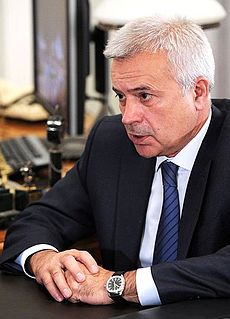A Quote by Kenneth Waltz
It is not true that were the Soviet Union to disappear the remaining states could easily live in peace.
Related Quotes
Why were the Europeans bothered about the Soviet Union at all? It was nothing to do with us. China had nothing to do with us. Why were we not building, without reference to the Soviet Union, a good society in our own countries? But no, we were all - in one way or another - obsessed with the bloody Soviet Union, which was a disaster. What people were supporting was failure. And continually justifying it.
European peace movement felt that the deployment of these missiles on European soil, on German soil would be a very great danger towards the Soviet Union in that those missiles could reach the Soviet Union, make it vulnerable within five to six minutes, that it could surgical strikes, strikes into the military infrastructure and that a strike into the military infrastructure could cause in fact World War III, an atomic world war and that this could also be used for first strike, for surgical search, first strike into the Soviet Union.
25 million of Russian people suddenly turned out to be outside the borders of the Russian Federation. They used to live in one state; the Soviet Union has traditionally been called Russia, the Soviet Russia, and it was the great Russia. Then the Soviet Union suddenly fell apart, in fact, overnight, and it turned out that in the former Soviet Union republics there were 25 million Russians. They used to live in one country and suddenly found themselves abroad. Can you imagine how many problems came out?
Back in the days of the Soviet Union, the countries of Eastern Europe, being under the control of the USSR, would call their states "people's republics." The sham that is currently going on in the states of the former Soviet Union is due to the fact that the politicians in power are eager to polish up their image abroad.
This much I would say: Socialism has failed all over the world. In the eighties, I would hear every day that there is no inflation in the Soviet Union, there is no poverty in the Soviet Union, there is no unemployment in the Soviet Union. And now we find that, due to Socialism, there is no Soviet Union!
The Soviet Union was brought down by a strange global coalition of Western European conservatives, Eastern European nationalists, Russian liberals, Chinese communists, and Afghan Islamic reactionaries, to name only a few. Many of these discordant groups disliked the United States intensely. But Americans were able to mobilize them to direct their ire at the Soviet Union first.
Kennedy was significantly different than Eisenhower before him, and different from Johnson after him. So those three years were the beginning of a détente with the Soviet Union, a new feeling for peace, a seeking out of a new ally with the Soviet Union - the end of the Cold War, as Kennedy called it in his American University speech.
Strong countries and strong presidents talk to their adversaries. That's what Kennedy did with Khrushchev. That's what Reagan did with Gorbachev. That's what Nixon did with Mao. I mean think about it. Iran, Cuba, Venezuela - these countries are tiny compared to the Soviet Union. They don't pose a serious threat to us the way the Soviet Union posed a threat to us. And yet we were willing to talk to the Soviet Union at the time when they were saying we're going to wipe you off the planet.





































